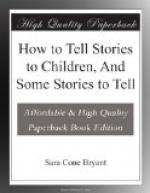THE CHILD-MIND; AND HOW TO SATISFY IT
“It is the grown people who make the nursery stories,” wrote Stevenson, “all the children do is jealously to preserve the text.” And the grown person, whether he makes his stories with pen or with tongue, should bring two qualities at least to the work—simplicity of language and a serious sincerity. The reason for the simplicity is obvious, for no one, child or otherwise, can thoroughly enjoy a story clouded by words which convey no meaning to him.
The second quality is less obvious but equally necessary. No absence of fun is intended by the words “serious sincerity,” but they mean that the story-teller should bring to the child an equal interest in what is about to be told; an honest acceptance, for the time being, of the fairies, or the heroes, or the children, or the animals who talk, with which the tale is concerned. The child deserves this equality of standpoint, and without it there can be no entire success.
As for the stories themselves, the difficulty lies with the material, not with the child. Styles may be varied generously, but the matter must be quarried for. Out of a hundred children’s books it is more than likely that ninety-nine will be useless; yet perhaps out of one autobiography may be gleaned an anecdote, or a reminiscence which can be amplified into an absorbing tale. Almost every story-teller will find that the open eye and ear will serve him better than much arduous searching. No one book will yield him the increase to his repertoire which will come to him by listening, by browsing in chance volumes and magazines, and even newspapers, by observing everyday life, and in all remembering his own youth, and his youthful, waiting audience.
And that youthful audience? A rather too common mistake is made in allowing overmuch for the creative imagination of the normal child. It is not creative imagination which the normal child possesses so much as an enormous credulity and no limitations. If we consider for a moment we see that there has been little or nothing to limit things for him, therefore anything is possible. It is the years of our life as they come which narrow our fancies and set a bound to our beliefs; for experience has taught us that for the most part a certain cause will produce a certain effect. The child, on the contrary, has but little knowledge of causes, and as yet but an imperfect realisation of effects. If we, for instance, go into the midst of a savage country, we know that there is the chance of our meeting a savage. But to the young child it is quite as possible to meet a Red Indian coming round the bend of the brook at the bottom of the orchard, as it is to meet him in his own wigwam.




